| Listing 1 - 10 of 11 | << page >> |
Sort by
|
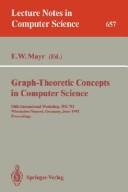
ISBN: 0387564020 Year: 1993 Volume: vol 657 Publisher: Berlin : Springer-Verlag,
Abstract | Keywords | Export | Availability | Bookmark
 Loading...
Loading...Choose an application
- Reference Manager
- EndNote
- RefWorks (Direct export to RefWorks)
Graph theory --- Congresses --- Algorithms --- Computer science --- Graph theory - Congresses. --- Algorithms - Congresses. --- Computer science - Congresses.

ISBN: 3540560637 Year: 1993 Publisher: Berlin New York Springer-Verlag
Abstract | Keywords | Export | Availability | Bookmark
 Loading...
Loading...Choose an application
- Reference Manager
- EndNote
- RefWorks (Direct export to RefWorks)

ISBN: 079232272X 9401047405 9401116911 9780792322726 Year: 1993 Volume: 396
Abstract | Keywords | Export | Availability | Bookmark
 Loading...
Loading...Choose an application
- Reference Manager
- EndNote
- RefWorks (Direct export to RefWorks)
Book

ISBN: 2878990706 9782878990706 Year: 1993 Publisher: Paris La Découverte
Abstract | Keywords | Export | Availability | Bookmark
 Loading...
Loading...Choose an application
- Reference Manager
- EndNote
- RefWorks (Direct export to RefWorks)
Aesthetics --- philosophy of art --- art [fine art] --- Iconography --- Art --- anno 1900-1999 --- Arts --- Philosophy --- Philosophie --- Art and science --- Poetics --- Congresses --- kunst --- kunsttheorie --- 7.01 --- kennisleer --- onderzoek in de kunsten --- esthetica --- kunst en wetenschap --- Radio broadcasting Aesthetics --- Art - Philosophy - Congresses --- Art and science - Congresses. --- Aesthetics - Congresses. --- Poetics - Congresses. --- art [discipline] --- kunst en politiek
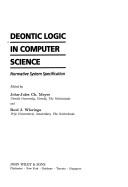
ISBN: 0471937436 9780471937432 Year: 1993 Publisher: Chichester Wiley
Abstract | Keywords | Export | Availability | Bookmark
 Loading...
Loading...Choose an application
- Reference Manager
- EndNote
- RefWorks (Direct export to RefWorks)
Deontic logic originated from moral philosophy and the philosophy of law as an attempt to formalise normative and legal reasoning. This book draws on the experience of researchers - working in fields as diverse as Artificial Intelligence, linguistics, computer system specification and law - who have discovered the benefits of deontic logic when applied to solving computer science and AI problems. A useful logic in which to specify normative system behaviour, deontic logic has a broad spectrum of possible applications within the field: from legal expert systems to natural language processing, database integrity to electronic contracting and the specification of fault-tolerant software. This book provides a unique and timely assessment of the practical value of deontic logic for computer scientists in AI and law and, more particularly, in such areas as distributed AI and intelligent cooperative information systems.
Computer science --- Deontic logic --- Informatique --- Logique déontique --- Congresses. --- Congrès --- Congresses --- -Deontic logic --- -Logic, Deontic --- Duty --- Modality (Logic) --- Informatics --- Science --- Computer science. --- Deontic logic. --- Deontische logica. --- Informatica. --- Deontische Logik. --- Informatik. --- Computers --- Congrès. --- Mathematical logic --- -Congresses --- Mathematical logic. --- Logique déontique --- Congrès --- Logic, Deontic --- Computer science - Congresses --- Deontic logic - Congresses
Book
ISBN: 3495477853 9783495477854 Year: 1993 Volume: 20 Publisher: Freiburg Alber
Abstract | Keywords | Export | Availability | Bookmark
 Loading...
Loading...Choose an application
- Reference Manager
- EndNote
- RefWorks (Direct export to RefWorks)
Sublanguage --- Communication in science --- Congresses. --- #GROL:SEMI-101<08> Gren 20 --- -Sublanguage --- -Language for special purposes --- Restricted language --- Special language --- Discourse analysis --- Language and languages --- Semantics --- Register (Linguistics) --- Communication in research --- Science communication --- Science information --- Scientific communications --- Science --- Congresses --- Variation --- -Congresses --- Sublanguage - Congresses. --- Communication in science - Congresses.

ISBN: 9051991401 9789051991406 Year: 1993 Volume: 36 Publisher: Amsterdam IOS
Abstract | Keywords | Export | Availability | Bookmark
 Loading...
Loading...Choose an application
- Reference Manager
- EndNote
- RefWorks (Direct export to RefWorks)
Transputers --- Real-time control --- Systems programming (Computer science) --- Industrial applications --- -#TELE:ACCA --- Real-time computer control --- Automatic control --- Integrated circuits --- Microcomputers --- System programming (Computer science) --- Computer programming --- Very large scale integration --- #TELE:ACCA --- Transputers - Congresses --- Real-time control - Congresses --- Systems programming (Computer science) - Congresses --- Transputers - Industrial applications - Congresses
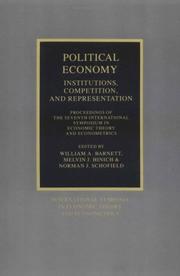
ISBN: 0521428319 9780521428316 Year: 1993 Volume: *1 Publisher: Cambridge, Mass.
Abstract | Keywords | Export | Availability | Bookmark
 Loading...
Loading...Choose an application
- Reference Manager
- EndNote
- RefWorks (Direct export to RefWorks)
Economics --- Political science --- AA / International- internationaal --- 330.1 --- 303.8 --- 330.00 --- 330.3 --- Domein en natuur van de staathuishoudkunde. --- Econometrische behandeling van een onderwerp. --- Economische en sociale theorieën: algemeenheden. --- Methode in staathuishoudkunde. Statische, dynamische economie. Modellen. Experimental economics. --- Congresses --- Econometrische behandeling van een onderwerp --- Economische en sociale theorieën: algemeenheden --- Domein en natuur van de staathuishoudkunde --- Methode in staathuishoudkunde. Statische, dynamische economie. Modellen. Experimental economics --- Political science - Congresses. --- Economics - Congresses.
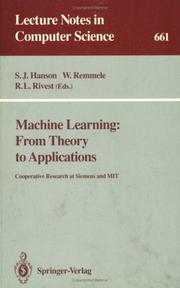
ISBN: 3540564837 0387564837 3540475680 Year: 1993 Volume: vol 661 Publisher: Berlin Springer
Abstract | Keywords | Export | Availability | Bookmark
 Loading...
Loading...Choose an application
- Reference Manager
- EndNote
- RefWorks (Direct export to RefWorks)
This volume includes some of the key research papers in the area of machine learning produced at MIT and Siemens during a three-year joint research effort. It includes papers on many different styles of machine learning, organized into three parts. Part I, theory, includes three papers on theoretical aspects of machine learning. The first two use the theory of computational complexity to derive some fundamental limits on what isefficiently learnable. The third provides an efficient algorithm for identifying finite automata. Part II, artificial intelligence and symbolic learning methods, includes five papers giving an overview of the state of the art and future developments in the field of machine learning, a subfield of artificial intelligence dealing with automated knowledge acquisition and knowledge revision. Part III, neural and collective computation, includes five papers sampling the theoretical diversity and trends in the vigorous new research field of neural networks: massively parallel symbolic induction, task decomposition through competition, phoneme discrimination, behavior-based learning, and self-repairing neural networks.
Artificial intelligence. Robotics. Simulation. Graphics --- Machine learning --- Congresses --- Artificial intelligence --- Neural networks (Computer science) --- Machine learning - Congresses. --- Artificial intelligence - Congresses. --- Neural networks (Computer science) - Congresses. --- Artificial intelligence. --- Computer science. --- Artificial Intelligence. --- Computation by Abstract Devices. --- Processor Architectures. --- Informatics --- Science --- AI (Artificial intelligence) --- Artificial thinking --- Electronic brains --- Intellectronics --- Intelligence, Artificial --- Intelligent machines --- Machine intelligence --- Thinking, Artificial --- Bionics --- Cognitive science --- Digital computer simulation --- Electronic data processing --- Logic machines --- Machine theory --- Self-organizing systems --- Simulation methods --- Fifth generation computers --- Neural computers
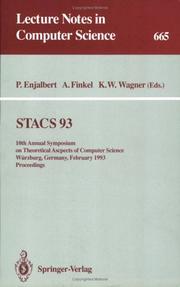
ISBN: 3540565035 0387565035 3540475745 Year: 1993 Volume: 665 Publisher: Berlin : Springer-Verlag,
Abstract | Keywords | Export | Availability | Bookmark
 Loading...
Loading...Choose an application
- Reference Manager
- EndNote
- RefWorks (Direct export to RefWorks)
This volume contains the proceedings of the tenth annual Symposium on Theoretical Aspects of Computer Science (STACS '93), held in W}rzburg, February 25-27, 1993. The STACS symposia are held alternately in Germany and France, and organized jointly by the Special Interest Group for Theoretical Computer Science of the Gesellschaft f}r Informatik (GI) and theSpecial Interest Group for Applied Mathematics of the Association Francaise des Sciences et Technologies de l'Information et des Syst mes (afcet). The volume includes the three invited talks which opened the three days of the symposium: "Causal and distributed semantics for concurrent processes" (I. Castellani), "Parallel architectures: design and efficient use" (B. Monien et al.), and "Transparent proofs" (L. Babai). The selection of contributed papers is organized into parts on: computational complexity, logic in computer science, efficient algorithms, parallel and distributed computation, language theory, computational geometry, automata theory, semantics and logic of programming languages, automata theory and logic, circuit complexity, omega-automata, non-classical complexity, learning theory and cryptography, and systems.
Computer science --- Informatique --- Congresses --- Congrès --- Congrès --- Computer science - Congresses. --- Information theory. --- Computer science. --- Computer software. --- Logic design. --- Theory of Computation. --- Computation by Abstract Devices. --- Algorithm Analysis and Problem Complexity. --- Logics and Meanings of Programs. --- Mathematical Logic and Formal Languages. --- Arithmetic and Logic Structures. --- Design, Logic --- Design of logic systems --- Digital electronics --- Electronic circuit design --- Logic circuits --- Machine theory --- Switching theory --- Software, Computer --- Computer systems --- Informatics --- Science --- Communication theory --- Communication --- Cybernetics
| Listing 1 - 10 of 11 | << page >> |
Sort by
|

 Search
Search Feedback
Feedback About UniCat
About UniCat  Help
Help News
News